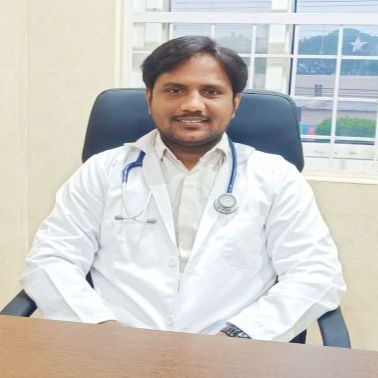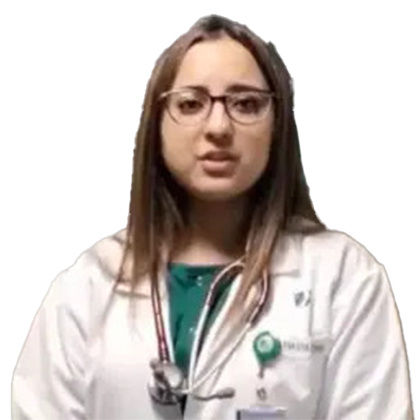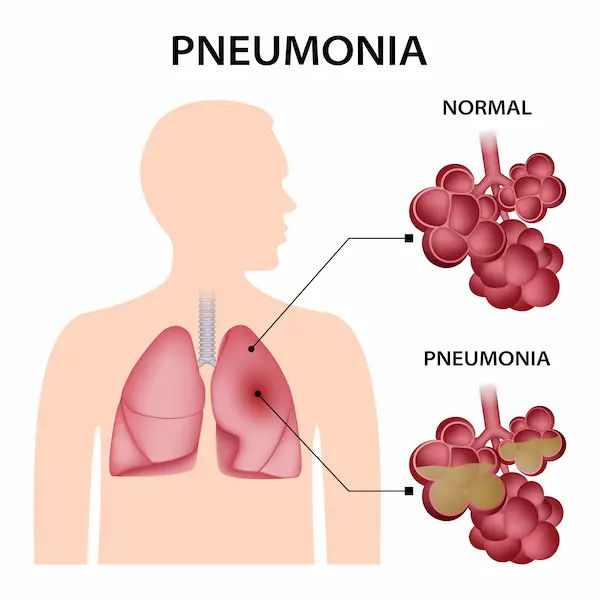Pneumonia Overview: Causes, Symptoms, and Treatment
Get a comprehensive overview of pneumonia, including its causes, symptoms, and treatment options. Learn how to recognize warning signs and manage the condition for a quicker recovery.


Pneumonia is a common but serious lung infection that affects millions of people every year. It can range from mild to life-threatening, especially in young children, older adults, and those with weakened immune systems. Understanding pneumonia, its causes, symptoms, and treatment can help you take the right steps to protect yourself and your loved ones.
What Is Pneumonia?
Pneumonia is an infection that inflames the air sacs in one or both lungs. These air sacs may fill with fluid or pus, making it difficult to breathe. The infection can be caused by bacteria, viruses, fungi, or other germs.
Consult a Top Pulmonologist
Common Causes of Pneumonia
Pneumonia can be triggered by different microorganisms:
1. Bacterial Pneumonia – The most common cause, often due to Streptococcus pneumoniae. It can develop on its own or after a cold or flu.
2. Viral Pneumonia – Viruses like influenza (flu), respiratory syncytial virus (RSV), and even COVID-19 can lead to pneumonia.
3. Fungal Pneumonia – Less common, usually affecting people with weakened immune systems or chronic illnesses.
4. Aspiration Pneumonia – Occurs when food, liquids, or vomit are inhaled into the lungs, often in people with swallowing difficulties.
Who Is at Risk?
While anyone can get pneumonia, some people are at higher risk:
- Infants and young children (under 2 years)
- Adults over 65
- People with chronic diseases (asthma, COPD, diabetes, heart disease)
- Smokers
- Those with weakened immune systems (due to HIV, chemotherapy, or long-term steroid use)
Symptoms of Pneumonia
Pneumonia symptoms can vary from mild to severe. Common signs include:
- Cough (may produce green, yellow, or bloody mucus)
- Fever, chills, and sweating
- Shortness of breath
- Chest pain (worse when coughing or breathing deeply)
- Fatigue and weakness
- Confusion (especially in older adults)
In severe cases, symptoms may include bluish lips (due to lack of oxygen), rapid breathing, and a high fever.
How Is Pneumonia Diagnosed?
If you suspect pneumonia, a doctor may perform:
- Physical exam (listening to your lungs with a stethoscope)
- Chest X-ray (to confirm infection in the lungs)
- Blood tests (to check for infection type)
- Sputum test (to identify the bacteria or virus)
- Pulse oximetry (to measure oxygen levels in the blood)
Get Your Health Assessed
Treatment Options
Treatment depends on the cause and severity:
1. Bacterial Pneumonia – Treated with antibiotics.
2. Viral Pneumonia – Antiviral medications may help, but rest and fluids are key.
3. Fungal Pneumonia – Requires antifungal drugs.
4. Supportive Care – Includes fever reducers (like acetaminophen), cough medicine (if needed), and plenty of fluids.
Hospitalization may be needed if symptoms are severe, especially for older adults, infants, or those with other health problems.
Recovery and Prevention
- Recovery time varies:
- Mild cases: 1-2 weeks
- Severe cases: Several weeks or longer
Prevention Tips
- Get vaccinated (flu shot and pneumococcal vaccine)
- Practice good hygiene (wash hands frequently, cover coughs/sneezes)
- Avoid smoking (smoking damages lung defenses)
- Strengthen immunity (eat a healthy diet, exercise, get enough sleep)
When to See a Doctor?
Seek medical help if you experience:
- Difficulty breathing
- Persistent high fever
- Confusion or drowsiness
- Worsening symptoms despite home care
If you or a loved one is at risk, consider booking a doctor consultation or lab test through Apollo 24|7 for timely diagnosis and treatment.
Final Thoughts
Pneumonia is a serious but manageable condition. Recognizing symptoms early and getting proper treatment can speed up recovery and prevent complications. Stay informed, take preventive steps, and don’t hesitate to seek medical advice when needed.
Consult a Top Pulmonologist
Consult a Top Pulmonologist

Dr. P Sravani
Pulmonology Respiratory Medicine Specialist
3 Years • MBBS, MD
Visakhapatnam
Apollo Clinic Vizag, Visakhapatnam

Dr. E Prabhakar Sastry
General Physician/ Internal Medicine Specialist
40 Years • MD(Internal Medicine)
Manikonda Jagir
Apollo Clinic, Manikonda, Manikonda Jagir
(125+ Patients)

Dr. K Prasanna Kumar Reddy
Pulmonology Respiratory Medicine Specialist
16 Years • MBBS, DTCD (TB&CHEST), DNB (PULM MED), FCCP
Hyderabad
Apollo Medical Centre Kondapur, Hyderabad

Dr. Hyder
Pulmonology Respiratory Medicine Specialist
5 Years • MBBS, MD (PULMONOLOGY)
Guntur
Kalam chest and multi-speciality clinic, Guntur

Dr. Aakanksha Chawla
Pulmonology Respiratory Medicine Specialist
9 Years • MD (Pulmonary Medicine), IDCCM, IFCCM (Indian Fellowship in Critical Care Medicine)
Delhi
Apollo Hospitals Indraprastha, Delhi
(250+ Patients)
Consult a Top Pulmonologist

Dr. P Sravani
Pulmonology Respiratory Medicine Specialist
3 Years • MBBS, MD
Visakhapatnam
Apollo Clinic Vizag, Visakhapatnam

Dr. E Prabhakar Sastry
General Physician/ Internal Medicine Specialist
40 Years • MD(Internal Medicine)
Manikonda Jagir
Apollo Clinic, Manikonda, Manikonda Jagir
(125+ Patients)

Dr. K Prasanna Kumar Reddy
Pulmonology Respiratory Medicine Specialist
16 Years • MBBS, DTCD (TB&CHEST), DNB (PULM MED), FCCP
Hyderabad
Apollo Medical Centre Kondapur, Hyderabad

Dr. Hyder
Pulmonology Respiratory Medicine Specialist
5 Years • MBBS, MD (PULMONOLOGY)
Guntur
Kalam chest and multi-speciality clinic, Guntur

Dr. Aakanksha Chawla
Pulmonology Respiratory Medicine Specialist
9 Years • MD (Pulmonary Medicine), IDCCM, IFCCM (Indian Fellowship in Critical Care Medicine)
Delhi
Apollo Hospitals Indraprastha, Delhi
(250+ Patients)
